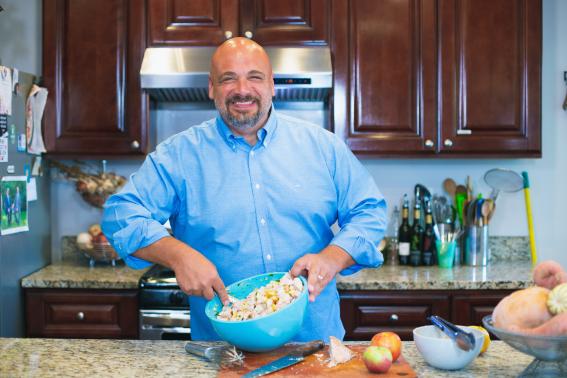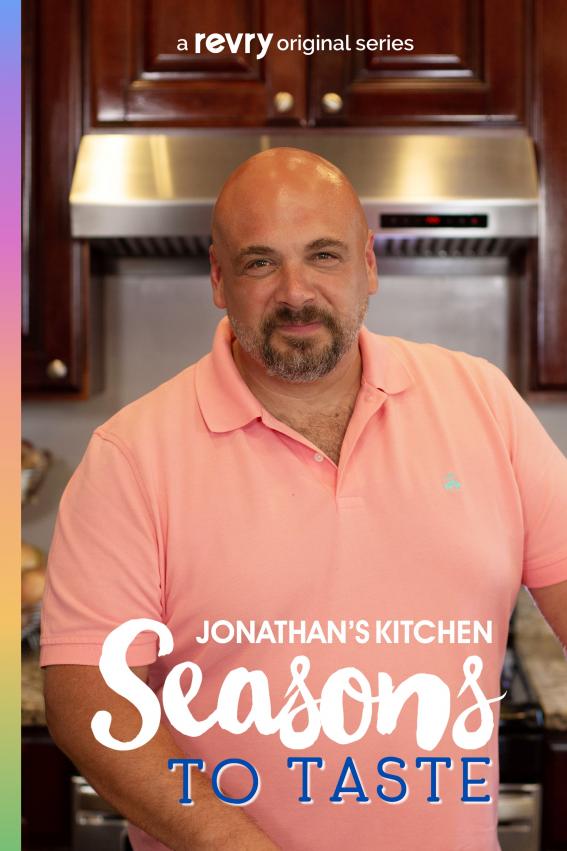MBA Alum Talks Cooking and Life
May 5, 2021

With growing media stature through appearances on ABC, CBS, and Fox, Bardzik is debuting his own 8-episode TV series, Jonathan’s Kitchen: Seasons to Taste, May 21 on Revry, a network that’s available as an app on all major streaming platforms. Prerecorded in his own kitchen (he lives with his husband in Washington, DC), the series also offers shopping visits to local farmers markets and guest appearances by accomplished chefs. “Connecting to the people who grow and produce what we eat is important,” he says. “It grounds us in the community of food.”
“My niche is combining food and storytelling to foster joy and connection,” Bardzik continues. Storytelling and conversation over food, he says, is deeply etched in the human experience. Stories locate you in time and place. They give you context and bring people together. And they can illustrate concepts that resonate with clients, from families to business, such as the members of the American Bankers Association. “I adapt my language and themes to my audience,” notes Bardzik. Risk management, for example, is critical in all businesses. So why not explore concepts of risk while preparing fragile dishes like Eggs Benedict and Hollandaise sauce?
For Bardzik, Isenberg professor Alan Robinson has been an enduring influence. “Alan uses stories to illustrate concepts in operations management. My own talks and conversations also rely on narratives,” Bardzik says. That includes workshops devoted to storytelling itself. “I owe a lot to Alan and Bob Nakosteen, who advocate strategic, big-picture thinking,” he emphasizes.
Stories, Math, and Food
In a recent visit via Zoom with Isenberg MBA students, Bardzik recalled that Nakosteen, who teaches statistics and economics, once told him and his classmates: “I want you to read the math in your textbook, and before you complain, let me tell you why you hate math.” Nakosteen went on to explain that pound for pound, on the printed page, math can yield far more information—often too much information—than the text. A one-line equation could easily take a page to explain. That has parallels in both business and life, Bardzik continued. One example from cooking: mirepoix. “Many of us have a five ingredient rule for simple meals,” he says. “Mirepoix, the French term for the aromatic flavor base of carrots, onion, and celery, often with parsley, thyme, and bay leaves, already exceeds that limit. Once you understand those ingredients capture one simple concept—a flavor base—they allow you to move more quickly in the kitchen, just like math can capture complex concepts simply and quickly.”

“Above all, lifestyle and joy have motivated my decisions,” he confessed to his audience of Isenberg grad students. “Nobody does what I do because they measure success by a paycheck.” At Isenberg, a finance course introduced him to the concept of risk premium: the safer your bet (e.g., buying bonds), the greater your peace of mind. When making a riskier bet (e.g., investing in a start-up fund), you want to see a higher return. Alternatively, you can view your work and lifestyle decisions through the lens of a joy premium, Bardzik told the students. You’ll likely earn less money and experience less upward mobility, but you’ll get out of bed each morning excited by your work. Chances are you’ll work just as hard as in a traditional job but your choice will prove energizing and renewing. And you’ll gain greater control over your work/life balance and need fewer compensatory material rewards than others who opt for less joyful occupations. For Bardzik, then, living by a joy premium has been an evolving realization—and a choice well taken.